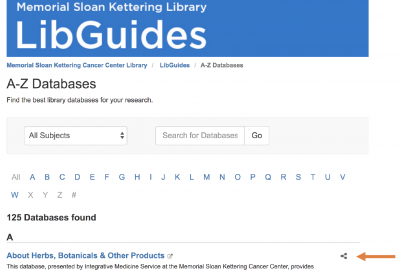At MSK Library, we strive to continuously improve the experience of our users as they interact with our resources. With this goal in mind, we wanted to share some improvements to our databases page.
- While our old page was a simple alphabetical list of all our databases, our new and improved page features a subject search, which allows users to narrow their database search by topics and disciplines of interest to them (e.g., Clinical Trials, Genetics, Dermatology).
- Know what database you’re looking for? Use the handy Search box to search by database name.
- You can now use the “share” icon to copy database URLs.

- If you’re not sure where to start, we now offer a “Popular Databases” section, which highlights our most heavily used databases.
If you prefer, you can still simply browse our databases list from A-Z.
We hope our new databases page will improve the workflows of MSK researchers and make their lives easier!
If you have any questions or comments, please feel free to AskUs.
 Want to learn more about the new PubMed? Register for our next open workshop on May 20.
Want to learn more about the new PubMed? Register for our next open workshop on May 20. 